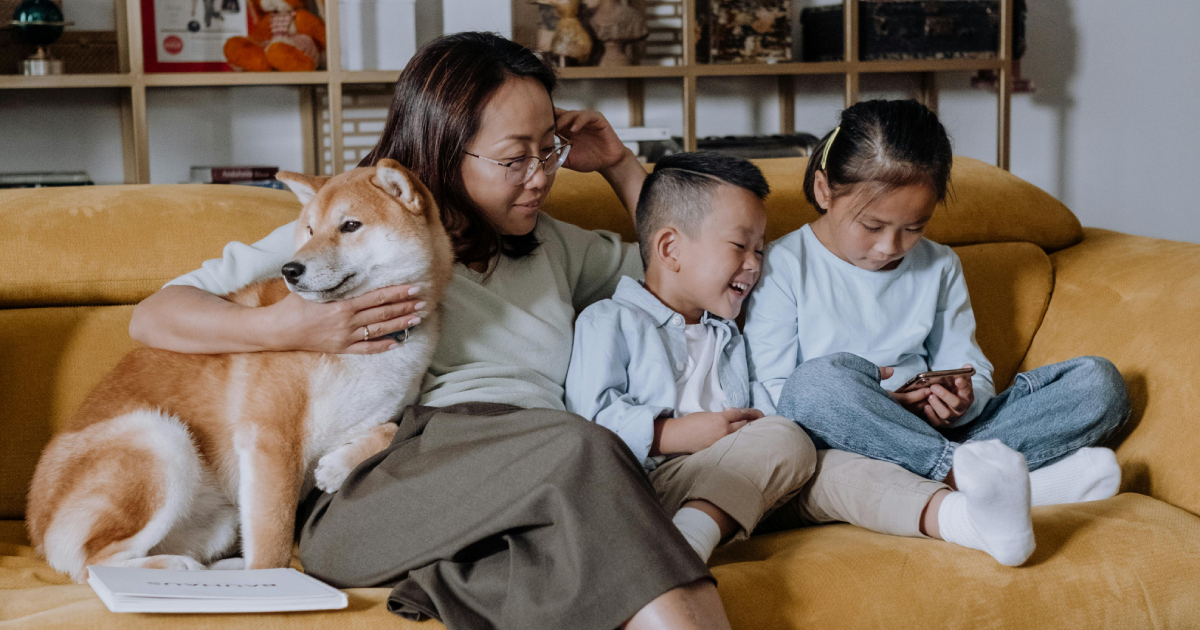Published date
Written by
Mom-of-four Samm Davidson had barely set down the groceries when she heard it — a "ping" from her son's wrist, followed by a suspicious giggle. What she thought was just a simple Apple Watch turned out to be her son's ticket into his "group chat era".
And suddenly, Samm felt like she'd stepped into a tween soap opera she hadn't signed up for.
One minute, she was hoping the watch would hold off the tide of preteen digital drama; the next, her kitchen was full of sixth-grade "dings" and "pings" as if it were a nerve centre for middle school gossip.
Let's be real-most parents feel a little dazed when they realise that their kids are more plugged into social circles than we are. Samm's story is all too familiar, and it brings us face-to-face with this brave new world of preteen group chats.
So, what does this "group chat era" mean for today's parents? And are any of us truly ready for it?

'The group chat era' begins - a story many parents can relate to
When Samm heard her son's group chat notifications, she approached him with curiosity and concern. She set boundaries: she'd be free to read his group chat messages to ensure they were safe and appropriate.
Initially, the messages were innocent and playful — full of middle-school humour, assignment reminders, sports talk, and emoji-filled banter. But even after scanning the harmless messages, Samm couldn't shake an uneasy feeling. Something about the "group chat era" felt chaotic, potentially messy, and out of her control.
Samm's story reflects a challenge many parents face today. With the rise of social media and constant digital interactions, children now have an environment where every joke, comment, and mistake can be recorded, screenshotted, and shared.
Like Samm, you may feel nostalgic for simpler times when the family phone sat in the kitchen, allowing parents to supervise conversations naturally.
A modern dilemma: Letting go in the group chat era
Let's be real: in this digital age, monitoring your child's conversations becomes increasingly tricky. Group chats introduce a new complexity to parenting that previous generations never had to face.
Samm reflects on this sentiment when she describes the strange, sometimes unsettling reality of 2024. She worries about the downsides of social media, where platforms like TikTok and Twitter can influence young minds. It's a reminder that today's parents face unique concerns about the impacts of early digital exposure.
In Samm's case, she made a difficult decision-to delete her son's access to the group chat. She weighed the social benefits her son might miss like being included in group plans or feeling connected to classmates.
But ultimately, Samm's concern over the social risks-hurting feelings, misinterpreted messages, or impulsive remarks with lasting consequences-led her to prioritise his safety over his potential FOMO (fear of missing out).
As parents, these decisions aren't easy, especially with the pressure to let children engage in activities "everyone else" is doing. But Samm's choice also highlights a powerful reminder that parents are the first line of guidance and protection in their child's social development.
By setting limits, we may feel "uncool," but we're also showing them how to make safe, healthy choices.

Setting boundaries in the group chat era
Navigating your child's "group chat era" might mean finding balance rather than taking extreme measures. Here are some ideas for setting boundaries that still allow your child a taste of independence while keeping their safety in check:
1. Create a "check-in" rule
Like Samm, let your child know you'll occasionally check their messages to ensure everything is appropriate. Regular check-ins provide a sense of oversight without heavy-handed monitoring.
2. Set time limits
Limiting how long your child spends in group chats each day can reduce distractions and help them focus on real-life interactions.
3. Encourage offline communication
Remind your child of the value of in-person conversations. Encourage meetups with friends after school or on weekends to keep their social skills grounded in face-to-face interaction.
4. Define "safe and appropriate" topics
Establish clear expectations about the kinds of topics and language that are acceptable in their digital interactions. Let your child know what behaviour is safe, and help them understand why certain things may be inappropriate or hurtful.

Letting kids be kids (without the ping of notifications)
Group chats aren't all bad; they can foster a sense of community and shared interests among children, especially as they navigate the complexities of middle school.
In Samm's story, it's clear that her son was delighted by his friends' company in the chat. When supervised appropriately, group chats can be a safe space for bonding, laughter, and support.
Yet, letting kids be kids doesn't necessarily mean allowing unsupervised digital freedom. In the age of the "group chat era," parents must decide when and how to introduce digital socialisation responsibly. Remember, there's no one-size-fits-all answer. What works for one family may not work for another.
Finding the right balance
As your child embarks on their "group chat era," finding a balance between granting freedom and ensuring safety is crucial. While we want to protect them, we also want to allow them the independence to make and learn from their own choices.
The next time your child asks to join a group chat, remember Samm's story. Feel free to discuss with your child the importance of safe digital practises.
Share your concerns openly; let them know that these limits aren't about denying fun but about building trust. With open communication, you can help them navigate their online interactions thoughtfully and responsibly.
Embrace the learning curve
Every child will eventually enter their "group chat era," and for most parents, this is both exciting and daunting. As Samm's story shows, there's a learning curve for everyone involved.
So embrace it, talk to your child, and remember: this is just one phase in the journey of parenting.
While the road may be bumpy, you're not alone in figuring it out. As long as you prioritise their safety and maintain open lines of communication, you'll both come out on the other side more equipped for the next digital milestone-whatever that may be.
Navigating the group chat era is a rite of passage for today's parents. The world is changing, and our kids are growing up in it-pings, emojis, and all.
[[nid:706705]]
